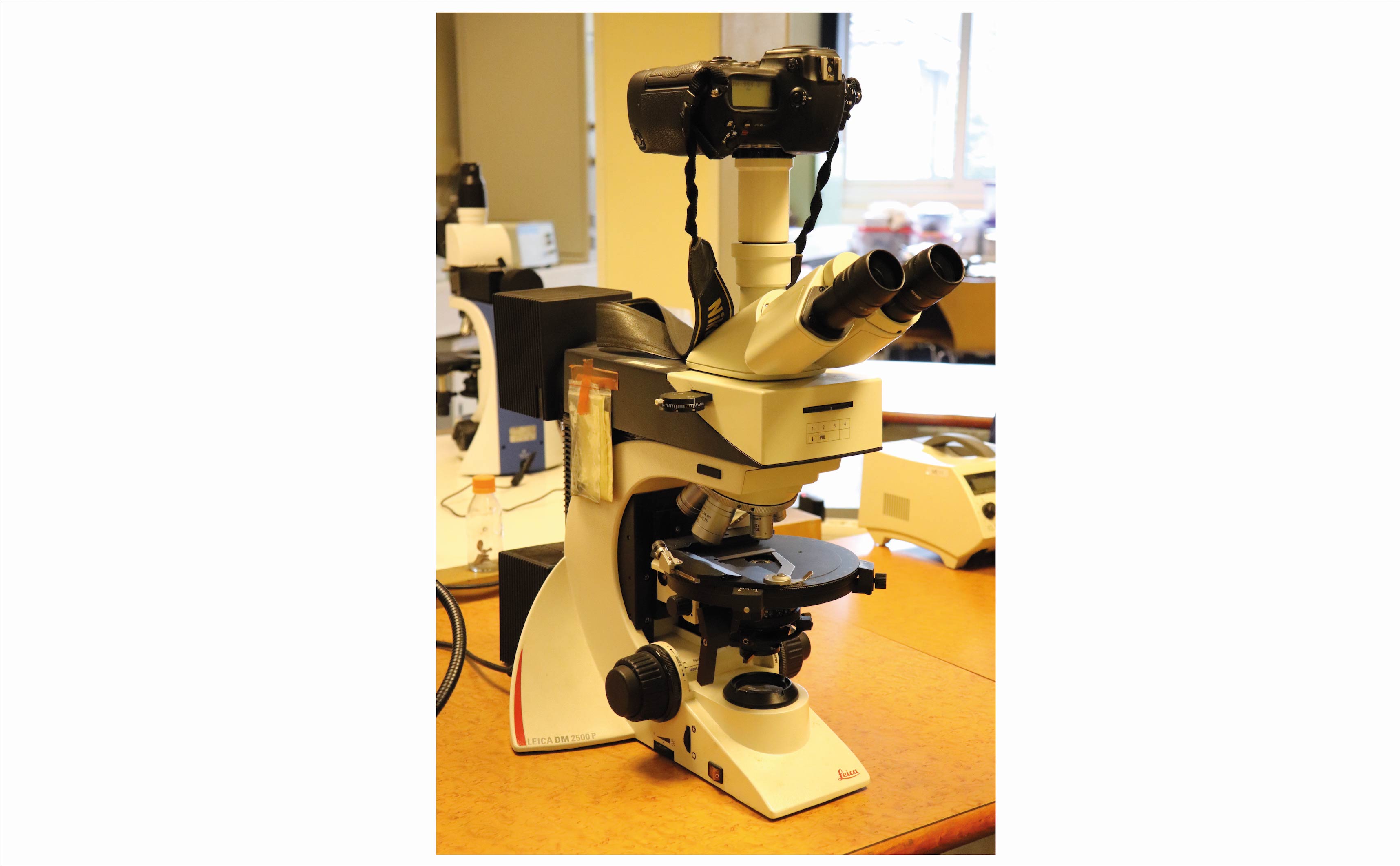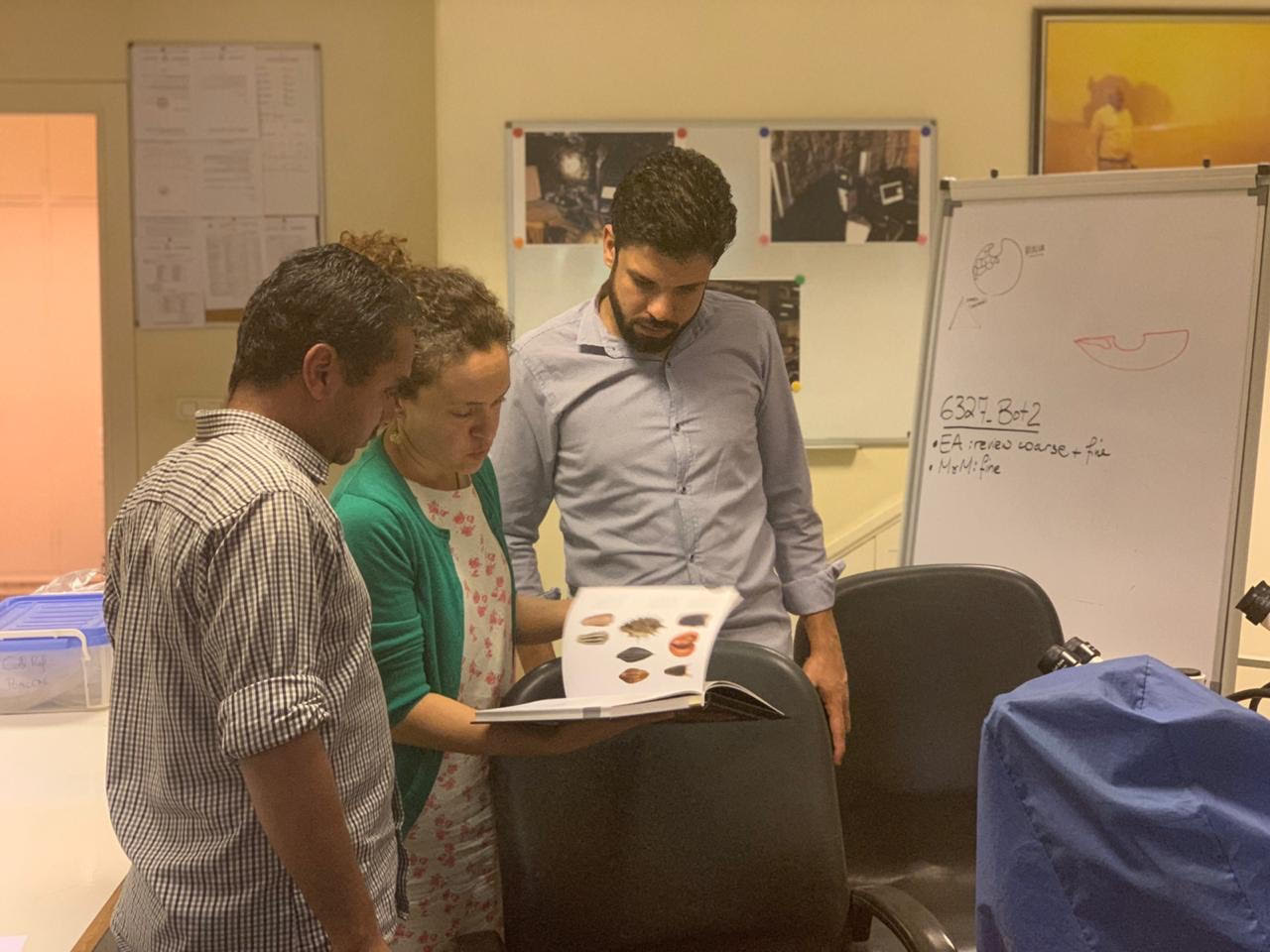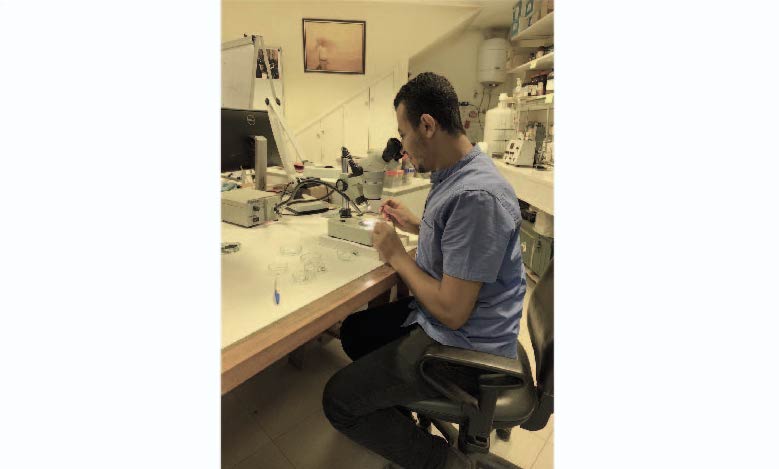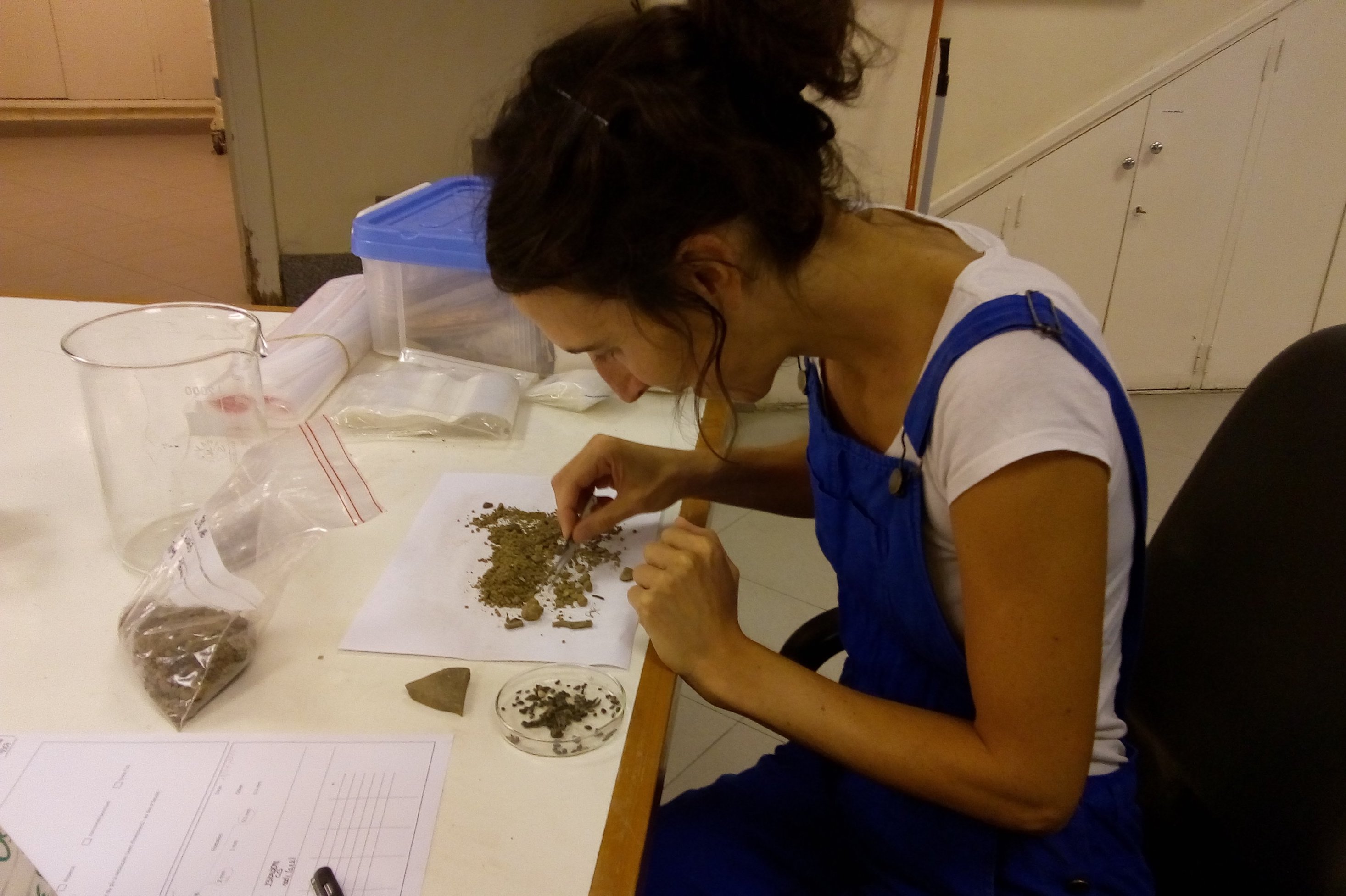Étude des Materiaux
Pour toute demande d’information préliminaire ou de caractère général :
- courrier électronique :
- téléphone : +202 279 00 255 ext 683/613
Heures d’ouverture du laboratoire : 08h30-13h et 14-16:30h, du dimanche au jeudi (sur rendez-vous: prenez contact au préalable).
Pour le suivi des travaux ou des questions techniques précises, voici la liste du personnel du laboratoire :
| Nadine Mounir | Responsable du pôle Archéométrie | |
| Nader Medhat Labib | Adjoint administratif et assisstant scientifique au responsable du pôle Archéométrie | |
| Sanaa Gaballah | Physicienne des matériaux | |
| Mennat-Allah El Dorry | Chercheure associée - archéobotanique - |
Introduction
Le laboratoire d’étude des matériaux se présente comme une plateforme multidisciplinaire et internationale qui accueille des spécialistes de disciplines très variées – physiciens, chimistes, archéobotanistes, archéozoologues, archéométallurgistes, sédimentologues, pétrographes etc. afin de conduire des investigations sur des archéomatériaux, dans les limites imposées par notre équipement propre et l'expertise disponible.
Notre laboratoire est ouvert à tous ! Nous fonctionnons en collaboration permanente avec les laboratoires du Ministère du Tourisme et des Antiquités, des universités, et des laboratoires privés, et assurons le transfert et le stockage d’échantillons archéologiques, en concertation avec le Centre de Recherche et de Conservation du Ministère du Tourisme et des Antiquités.
Notre mission principale est la caractérisation des matériaux anciens mis au jour sur les sites archéologiques. Nos études visent à restituer des chaînes opératoires sur les pratiques et techniques anciennes, la détermination de provenance et d’origine des matières premières ou encore la reconstitution de paléo-environnements. Pour cela, nous mettons nos équipements et l'expertise du laboratoire au service des chercheurs et spécialistes qui viennent séjourner chez nous. Lorsque des analyses complémentaires non disponibles sont nécessaires, nous collaborons avec d'autres laboratoires en Égypte, dans le respect de la réglementation du Ministère du Tourisme et des Antiquités.
Protocole de transfert d'échantillons
Le transfert des échantillons est règlementé par la décision du Comité Permanent N° 295 du 23 mai 2019". Toute mission souhaitant transférer des échantillons au laboratoire d'étude des matériaux doit avoir l'autorisation préalable du Comité Permanent précisant les types de matériaux autorisés et les investigations qu’elle envisage de mener.
Avant de procéder à l'échantillonnage sur site, il est indispensable de contacter le Centre de Recherche et de Conservation (Dr. Dalia El Meligy: et Dr. Ashraf Nagueh: ) cinq jours à l'avance pour programmer la présence d’un représentant du CRC, afin de superviser l’échantillonnage et le transfert des échantillons. Le détail des échantillons demandés pour transfert doit être synthétisé dans un tableau (Formulaire Transfert Echantillon), puis envoyé au Centre de Recherche et de Conservation et au laboratoire d'étude des matériaux (Nadine Mounir: et Nader Medhat: ).
Le transfert des échantillons se fait en deux étapes :
– un premier transfert du site vers le Centre de Recherche et de Conservation (CRC), dont la date est fixée par le responsable de mission ou son représentant, en concertation avec les représentants du CRC. Le laboratoire souhaite être informé de ce premier transfert pour mieux suivre le dossier.
– Le deuxième transfert entre le Centre de Recherche et de Conservation et le laboratoire d'étude des matériaux de l’Ifao est décidé lorsque ce dernier est prêt à entamer immédiatement l'étude. Tout déplacement d'échantillons se fait via les représentants du Ministère du Tourisme et des Antiquités, après rédaction de procès-verbaux.
Afin d’organiser au mieux l’étude en laboratoire et vérifier les disponibilités des équipements, nous demandons aux responsables de mission de nous contacter bien en amont de la venue de spécialistes (un mois et demi au minimum et trois mois s'il faut prévoir la préparation de lames minces de céramique ou de pierre). Un devis est alors envoyé pour validation. Dès retour signé, nous contactons le CRC pour demander le transfert des échantillons une semaine avant la venue du chercheur. A son arrivée au laboratoire, nous demanderons au chercheur de remplir et signer un formulaire de présence (Formulaire Sejour Laboratoire). À la fin du séjour, une facture est envoyée au responsable de mission pour règlement au service comptable de l’Ifao.
For any request of information, you can contact us:
- email:
- telephone: +202 279 00 255 ext 683/613
Laboratory opening hours: 8:30AM-1PM and 2-4:30PM, Sunday to Thursday (by appointment: contact beforehand).
To follow up your work or for specific technical questions, we are available by email:
| Nadine Mounir | Head of the Archeometry department | |
| Nader Medhat | Administrative deputee and scientific assistant of the head of the Archeometry department | |
| Sanaa Gaballah | Material Physicist | |
| Mennat-Allah El Dorry | Associate researcher - archaeobotanical studies - |
Introduction
The materials study laboratory presents itself as a multidisciplinary and international platform which welcomes specialists from a wide variety of disciplines - physicists, chemists, archaeobotanists, archaeozoologists, archaeometallurgists, sedimentologists, petrographers, etc., in order to conduct investigations on archaeomaterials, within the limits imposed by our own equipment and available expertise.
Our laboratory is open to everyone! We operate in permanent collaboration with the laboratories of the Ministry of Tourism and Antiquities, universities and private laboratories. We ensure the transfer and storage of archaeological samples, in consultation with the Research and Conservation Center of the Ministry of Tourism and Antiquities.
Our main mission is the characterization of ancient materials unearthed on the archaeological sites. Our studies aim to restore operating chains of ancient practices and techniques, the determination of the provenance and origins of raw materials or even paleo-environmental reconstructions. For this, we put our equipment and laboratory expertise at the service of researchers and specialists who come to stay with us. When additional necessary analyses are not available, we collaborate with other laboratories in Egypt, in compliance with the regulations of the Ministry of Tourism and Antiquities.
Samples transfer protocol
The transfer of samples is regulated by the decision of the Permanent Committee N ° 295 of May 23, 2019 ". Any mission wishing to transfer samples to the materials study laboratory must have the prior authorization of the Permanent Committee specifying the types of materials authorized and the investigations it plans to carry out.
Before sampling on site, it is essential to contact the Research and Conservation Center (Dr. Dalia El Meligy: and Dr. Ashraf Nagueh: ) five days in advance to schedule the presence a representative of the RCC, to supervise the sampling and the transfer of the samples. A table must be provided with the details of the samples requested for transfer (sample transfer table) This table must be sent to the Research and Conservation Center (Dr. Dalia El Meligy: egydalia@hotmail.com and Dr. Ashraf Nagueh: ashrafnageh@gmail.com) and the materials study laboratory (Nadine Mounir: and Nader Medhat: ).
The transfer of samples is done in two stages:
- a first transfer takes place from the site to the Research and Conservation Center (RCC), the date of which is fixed by the head of the mission or his representative, in consultation with the RCC representatives. The laboratory wishes to be informed of this first transfer in order to have a better follow up of the case.
- The second transfer between the Research and Conservation Center and the IFAO materials study laboratory is decided when the latter is ready to immediately begin the study. Any movement of samples is made via the representatives of the Ministry of Tourism and Antiquities, after writing official records.
In order to best organize the study in the laboratory and check the availability of equipment, we ask the head of the missions to contact us well in advance of the arrival of specialists (a month and a half minimum and three months in case of the preparation of thin sections from pottery or stone). A quote is then sent for validation. As soon as it is retuned signed, we contact the RCC to request the transfer of the samples a week before the researcher's arrival. Upon arrival at the laboratory, we will ask the researcher to fill out and sign an attendance form (laboratory attendance form). At the end of the stay, an invoice is sent to the head of the mission for payment to the accounting department of the IFAO.
المقدمة
يعد معمل دراسة المواد منصة دولية متعددة التخصصات ترحب بالمتخصصين من مجموعة واسعة من المجالات مثل الفيزيائيين والكيميائيين وعلماء النبات الأثري وعلماء الحيوان الأثري وأخصائي علم المعادن الأثري وعلماء دراسة التربة وعلماء دراسة الصخور وغيرهم من أجل إجراء دراسات في المواد الأثرية وفقا للمعدات المتوافرة لدينا والخبرات المتاحة.
معملنا مفتوح للجميع! اننا نتعاون دائما مع معامل وزارة السياحة والآثار والجامعات والمعامل الخاصة ونقوم بنقل وتخزين العينات الأثرية بالتشاور مع مركز بحوث وصيانة الآثار التابع لوزارة السياحة والآثار.
ان مهمتنا الرئيسية هي تعريف المواد الأثرية المكتشفة في المواقع الأثرية وتهدف دراساتنا إلى اعادة تسلسل ما حدث من ممارسات وتقنيات قديمة، وتحديد منشأ وأصل المواد الأولى بل وإعادة بناء البيئة القديمة. لهذا نحن نضع معداتنا وخبراتنا المعملية في خدمة الباحثين والمتخصصين الذين يأتون بهدف الدراسة والتحليل. وفي حالة عدم توفر التحاليل التكميلية اللازمة، نتعاون مع معامل أخرى في مصر، وفقًا للوائح وزارة السياحة والآثار.
بروتوكول نقل العينات
ينظم نقل العينات قرار من اللجنة الدائمة رقم 295 بتاريخ 23 مايو 2019
ينبغي على أي بعثة ترغب في نقل عيناتها إلى معمل دراسة المواد الحصول على إذن مسبق من اللجنة الدائمة التي تحدد أنواع المواد المصرح بها والتحاليل التي تخطط للقيام بها.
قبل أخذ العينات من الموقع ، من الضروري الاتصال بمركز بحوث و صيانة الآثار (داليا المليجي: و أشرف ناجح ) خمسة أيام قبل تحديد موعد حضور ممثل من جانبه من أجل الإشراف على أخذ العينات ونقلها و يجب أيضا ارسال جدول بتفاصيل العينات المطلوبة للنقل (جدول نقل العينات) إلى مركز بحوث و صيانة الآثار (داليا المليجي: وأشرف ناجح ) و الى معمل دراسة المواد الأثرية (نادين منير: و نادر مدحت: ).
يتم نقل العينات على مرحلتين:
- تتم المرحلة الأولى من النقل من الموقع إلى مركز بحوث وصيانة الآثار حيث يتم تحديد تاريخه من قبل رئيس البعثة أو ممثله، بالتشاور مع ممثلي مركز بحوث وصيانة الآثار. ان معمل دراسة المواد يرغب في إبلاغه بهذا النقل الأول من أجل متابعة الملف بشكل أفضل.
- تتم المرحلة الثانية من النقل بين مركز بحوث وصيانة الآثار ومعمل دراسة المواد الأثرية بالمعهد العلمي الفرنسي عندما يكون الأخير جاهزًا لبدء الدراسة على الفور ويتم نقل العينات عن طريق ممثلي وزارة السياحة والآثار بعد كتابة المحاضر الرسمية.
من أجل تنظيم الدراسة بشكل أفضل في المعمل والتحقق من توافر المعدات، نطلب من رؤساء البعثات الاتصال بنا قبل قدوم المتخصصين بوقت كاف (شهر ونصف على الأقل وثلاثة أشهر في حالة طلب تجهيز قطاعات رقيقة من الفخار أو الحجر). ثم يتم إرسال عرض سعر للموافقة والاتفاق على السعر. بمجرد ارسال العرض موقعا نقوم بالاتصال بمركز بحوث وصيانة الآثار لطلب نقل العينات قبل أسبوع من وصول الباحث وعند وصول الأخير إلى المعمل نطلب منه ملء نموذج الحضور (نموذج الحضور الى المعمل) والتوقيع عليه وفي نهاية اقامته، يتم إرسال فاتورة إلى رئيس البعثة للدفع من خلال قسم الحسابات بالمعهد العلمي الفرنسي للآثار الشرقية.






